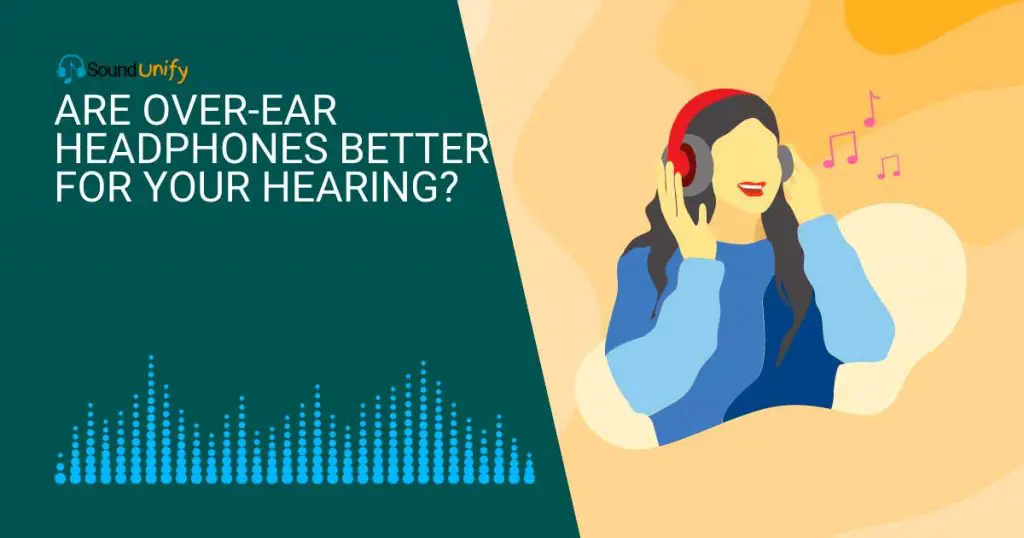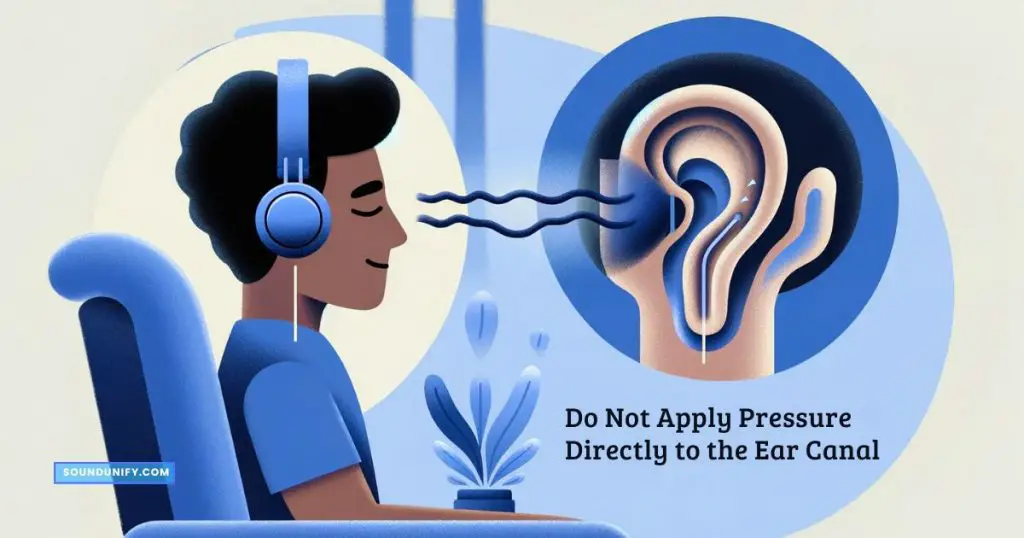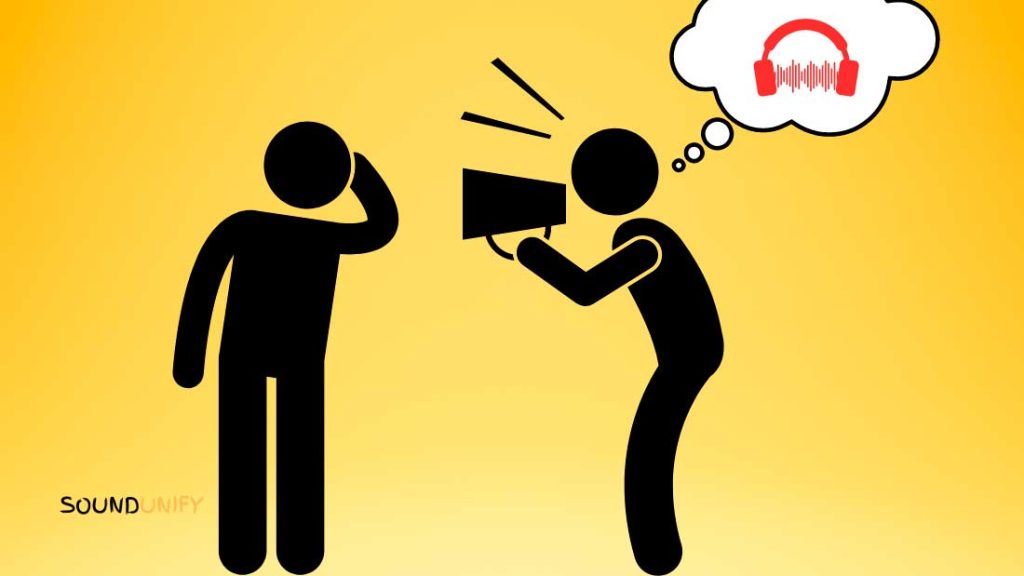Yes, over-ear headphones can be safer for your hearing as they often require lower volumes than in-ear types. However, prolonged exposure to high volumes can still cause damage, regardless of headphone type.
Being music lovers and audiophiles, you might look for headphones to protect your hearing and wonder are over-ear headphones better for your hearing than earbuds.
Some people believe that over-ear headphones can damage your ears more than good. However, it’s worth considering the pros and cons of over-ear headphones before deciding.
Over-ear headphones are often marketed to protect your hearing and for a good reason. As we age, our ears become more susceptible to noise-induced damage.
Moreover, over-ear headphones allow us to hear sounds more clearly than regular headphones, improving productivity. So, if you’re concerned about your hearing, try over-ear headphones.

8 Reasons Why Over-Ear Headphones Better for Hearing
Over-ear headphones can provide better sound quality and more isolation from outside noise than earbuds, making them a good choice if you’re looking for headphones to use in a noisy environment. They can also be more comfortable to wear for long periods.
1. Provide Better Sound Quality

Regarding delivering superior sound quality, over-ear headphones are my top pick. They typically have more significant drivers, the components responsible for converting electrical signals into sound. This means they can produce a fuller range of audio frequencies, allowing me to hear every detail in my favorite songs.
- Richer Bass: The larger ear cups allow for a deeper and more resonant bass, which is crucial for a fully immersive listening experience.
- More transparent Highs: The precision of over-ear headphones in reproducing high-frequency sounds is unparalleled, making every note crystal clear.
- Balanced Midrange: The midrange frequencies are well-represented, ensuring vocals and instruments are lifelike and accurate.
| Feature | Over-Ear Headphones | In-Ear Headphones |
|---|---|---|
| Driver Size | Larger | Smaller |
| Bass Quality | Richer | Less Resonant |
| Highs | Clearer | Can be Muffled |
| Midrange | Balanced | May Lack Depth |
2. Blocking Out External Noise

Over-ear headphones are exceptional at isolating me from unwanted ambient noise. They envelop the entire ear, creating a seal that effectively keeps external sounds at bay. This means I can enjoy my music without cranking up the volume, which benefits my hearing health.
- Passive Noise Isolation: The cushioning acts as a barrier, preventing environmental noise from entering.
- Active Noise Cancellation: Many models use technology that neutralizes external sounds, allowing for a more focused listening experience.
3. Diffuse Sound Around Your Ear

The design of over-ear headphones is such that they allow sound to be diffused around the entire ear. This results in a more natural and spacious soundstage, giving the impression of being in the same room with the musicians. The sound envelopes me, allowing for a more immersive and enjoyable listening experience.
4. More Comfortable to Wear for Long Periods of Time

Over-ear headphones are the most comfortable, especially during extended listening sessions. They distribute weight evenly around the ear, reducing pressure points and allowing for extended periods of wear without discomfort.
- Padded Ear Cups provide a relaxing and comfortable fit, preventing fatigue.
- Adjustable Headband: Allows for a customized fit, ensuring the headphones stay in place without being too tight.
5. Do Not Apply Pressure Directly to the Ear Canal

One of the advantages of over-ear headphones is that they do not insert into the ear canal, eliminating the risk of ear discomfort and potential damage to the delicate structures within the ear. This design ensures that the sound waves are not directed straight into the ear canal, reducing the risk of hearing damage.
6. They are Less Likely to Cause Tinnitus

Tinnitus is a condition characterized by ringing in the ears, and it can be triggered by prolonged exposure to loud noises. Over-ear headphones lower the risk of tinnitus, allowing for lower volume levels due to their noise isolation capabilities.
- Lower Volume Levels: Effective noise isolation means you don’t have to reduce the volume to compete with external noises.
- Reduced Ear Canal Pressure: The lack of direct pressure to the ear canal minimizes the chances of developing tinnitus symptoms.
7. Protect Your Hearing from Sudden Loud Noises

Protecting my hearing is crucial, and over-ear headphones are excellent. They act as a shield, preventing sudden and loud noises from reaching my ears directly. This is especially important in noisy environments where sudden spikes in volume can occur unexpectedly.
8. Can Be Used with Hearing Aids
For those who use hearing aids, over-ear headphones are a practical choice. They can comfortably accommodate most hearing aids, allowing users to enjoy music without interference.
- Compatibility: Most over-ear models are compatible with behind-the-ear (BTE) and in-the-ear (ITE) hearing aids.
- No Feedback Issues: The distance between the headphone speakers and hearing aids reduces the chances of feedback noise.
| Feature | Over-Ear Headphones | In-Ear Headphones |
|---|---|---|
| Hearing Aid Compatibility | Yes (Most Models) | Limited |
| Risk of Feedback | Lower | Higher |
Over-ear headphones are a superior choice for anyone looking to enjoy high-quality sound while prioritizing hearing health and comfort. Whether you’re an audiophile or just someone who loves to listen to music, investing in a good pair of over-ear headphones is a sound decision.
The Reality of Hearing Loss

Hearing loss is common and affects people of all ages. According to the National Institute on Deafness and Other Communication Disorders, nearly 15% of adults (37.5 million) in the U.S. have hearing loss.
It’s even more prevalent among older adults – 1 out of every 3 people over age 60 to 74 has some hearing damage, ranging from mild to profound.
As you may have guessed, wearing headphones at a high volume for long periods can cause your ears to become tired and susceptible to noise-induced damage such as tinnitus or ear ringing.
In fact, the World Health Organization has classified noise-related hearing loss as a global public health problem.
The good news is that there are steps that you can take to protect your ears and minimize the risk of damage. First and foremost, listen to music at a low volume or use earbuds when possible. And if you do decide to wear headphones, make sure to follow these safety guidelines.
Can Over-Ear Headphones for Use With Hearing Aids?
Yes, you can use over-ear headphones with hearing aids. In fact, they can be an excellent option for people with hearing aids, as they can help block out background noise and make it easier to hear the sound from the headphones.
Though, there are a few things to remember when using over-ear headphones with hearing aids.
- Be sure to consult with your audiologist to ensure that they will work well together.
- Make sure that the headphones are compatible with your hearing aid.
- Ensure to adjust the volume on the headphones so that it is comfortable for you to hear.
| Headphone Model | Compatibility with Hearing Aids |
|---|---|
| Bose QuietComfort 35 II | Yes |
| Sony WH-1000XM4 | Yes |
| Sennheiser HD 660 S | Yes |
| Audio-Technica ATH-M50x | Yes |
| JBL Everest Elite 750NC | Yes |
When choosing over-ear headphones to use with hearing aids, it is important to consider compatibility factors. The above table highlights some popular headphone models that work well with hearing aids.
These headphones are designed to provide a comfortable listening experience while accommodating the presence of hearing aids.
However, consulting with your audiologist or hearing healthcare professional for personalized advice based on your hearing aid model and needs is always recommended.
Can Headphones Cause Hearing Loss?

It is not an exaggeration to say that most of the time, we don’t realize how time flies when we start listening to music. For that, using headphones excessively and listening to music at high volumes could damage your ears. Other factors that can increase your risk of hearing loss include:
- Being exposed to loud noises regularly.
- Having a history of ear infections or other ear problems.
- Using headphones in a crowdie place.
Generally, it’s best to consult a healthcare professional if you’re concerned about your hearing. However, go ahead if you’re using headphones for personal use and don’t experience any negative effects.
So, here are some precautions about using over-ear headphones that won’t drive your hearing loss.
1. Balancing volume with the length of listening
You may listen to an audiobook or music for an extended period; make sure to adjust the volume not to exceed 80-85 dBA. This is the level of sound that an air-conditioner, a lawnmower, or heavy traffic makes. According to WHO, you can use 80 dBA to listen to music for 40 hours a week.
Excessive noise can cause permanent damage and hearing loss. Ideally, suppose you must use headphones for lengthy periods. In that case, we recommend using in-ear monitors that plug into your device because they are more discreet and don’t produce excessive sound.
2. Set the volume level to no more than the safe level
If you’re using headphones at home, remember to set the volume level on your device to “low” or “muted.” Because if you put headphones in your ear while the volume is too high, it can suddenly damage your eardrum.
3. Wear a good noise-canceling headset
Consider investing in a good pair of noise-canceling headphones if going out is your priority, not hearing loss prevention. They’ll make the music sound great without blasting other people nearby with the sound.
While working out, if you choose to wear headphones, it is also essential to be aware of the safety guidelines below for you do not experience hearing loss.
Moreover, good noise-canceling headphones help minimize background noise so you can focus on your music.
4. Let your ears rest
When your workout is over, give your ears a break. Allow them to rest for at least 10 minutes every 60 minutes to restore lost hearing. It will be perfect if you rest for 5 minutes every 30 minutes.
In addition, use a foam earplug if you’re listening to music or audiobooks at home. These plugs help reduce sound and protect your ears against excessive noise.
5. Stop using headphones if you start to experience hearing loss
It is alarming if you experience any changes in hearing, such as ringing, tinnitus (a humming or buzzing in the ears), decreased volume, or difficulty understanding people speaking near you. Then it’s time to take a break from headphones and see your doctor for an evaluation.
Otherwise, continue to use headphones at a low volume and pay attention to the safety guidelines above.
6. Never share your headphones
Commonly, ear cups or earbuds can be affected by bacteria from anyone’s unclean or sweaty ear. It is also unhygienic to share it. So, never loan your headphones to a friend or coworker – keeping them for yourself is essential.
If someone attempts to share headphones with you, be skeptical and insist they move their device away from your ears. Therefore, it’s important to have a pair of headphones that fit your needs.
7. Wear your headphones properly
Please don’t wear them so tight that they cause pain or discomfort. Also, keep the ear cups tilted towards your ears and adjust the headband if necessary. Finally, ensure the headphones are plugged into an appropriate outlet and not directly into your computer. It will prevent your ear from any damage.
Can Headphones or Earbuds Generally Cause Ear Infections?
Much circumstantial evidence suggests that ear infections may be more likely when headphones or earbuds are used excessively.
It’s best practice to keep the volume levels low and avoid using them if you have a head cold or flu. If you get an ear infection while wearing headphones, check with your doctor for treatment advice.
How to Keep Your Ears Safe from Common Cause of Preventable Hearing Loss?
Here are some suggestions that will keep your ear safe from damage.
- Use earbuds or headphones carefully because too much loud music can cause hearing damage.
- Keep the volume levels low when listening to music or using other audio sources.
- Avoid using them if you have a cold or flu.
- Avoid listening to high volumes for long periods.
- Clean your earphones and headphones regularly with wet wipes.
- Wear earplugs when participating in noisy activities.
- Don’t over-stuff your ear canals.
- Ensure the headphones fit well and are not too tight or loose.
- Don’t stack headphones on top of each other.
- Be aware of including metal objects such as coins or earrings when using headphones.
- Keep the phone away from your body when you’re listening to music.
- Visit your doctor if you experience any hearing problems.
Avoid Common Headphone Mistakes
There are a few common mistakes people make when using headphones.
First, they often don’t clean them properly and regularly. This can lead to a build-up of earwax and other dirt, eventually damaging the headphones.
Second, people often don’t store them properly, which can cause them to become tangled or bent. This can also damage the headphones.
Third, they don’t hesitate to use cheap or damaged headphones. Cheap headphones contain poor sound quality. They also do not maintain ear ergonomics. So, you must keep a high volume to listen to the music.
Finally, people often don’t use the correct size or type of headphones for their ears, which can lead to discomfort or even pain.
If you’re still worried about the safety of your ears when listening to the audio, consider purchasing a set of noise-canceling earbuds. These devices help block out ambient noise so that you can concentrate on what’s playing in your music or video clip without fear of damaging your hearing.
FAQs
Are over-ear headphones better for your hearing than earbuds?
Over-ear headphones can be better for your hearing than earbuds because they provide a better seal around the ear, which can help block out external noise and reduce the risk of hearing damage.
Can over-ear headphones cause hearing damage?
Over-ear headphones can cause hearing damage if used at a high volume for prolonged periods. It is essential to use headphones responsibly and to take breaks when necessary.
How loud is too loud when listening to music?
According to the World Health Organization, listening to music at a volume of 85 decibels (dB) or higher for prolonged periods can cause hearing damage.
How can I protect my hearing when using headphones?
To protect your hearing when using headphones responsibly, choose the right headphones, take breaks, and get your hearing checked regularly.
Can I still enjoy my music while protecting my hearing?
Yes, you can still enjoy your music while protecting your hearing. Using headphones responsibly and taking breaks when necessary allows you to enjoy your music without risking your hearing.
Conclusion
Always remember that using headphones excessively can increase your risk of developing an ear infection or hearing loss in the future.
Keep the volume levels low and avoid stacking headphones on each other – this will help reduce any potential damage caused by interference.
James Dimento is a Chief-in-Editor of SoundUnify. He is a headphone enthusiast and creative writer passionate about audio technology. He has three years of experience writing about headphones and sound quality and is responsible for creating reviews and taking care of all administration.
